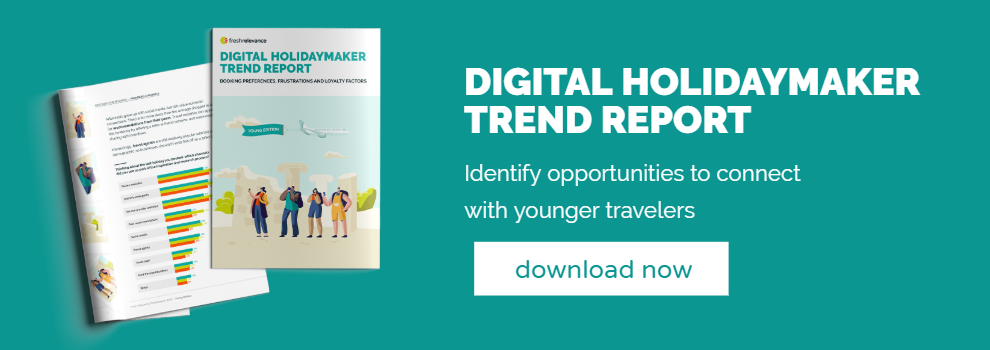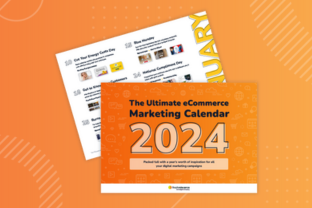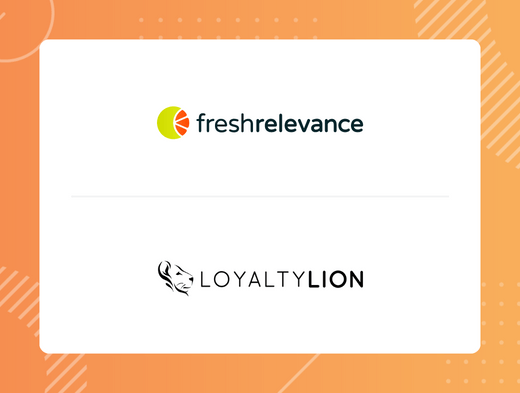The way we travel is changing. Younger travel buyers in particular are increasingly shunning generic package holidays in favor of Instagram-worthy life experiences.
To keep up, travel providers must meet these aspirational young holidaymakers on the channels where they feel most comfortable, with content that both informs and inspires.
With this in mind, we polled Gen Z and Millennial consumers to identify how new technologies and marketing methods can enhance the travel buying experience, tapping into the Gen Z and Millennial travel trends.
Along the way, we learned that shoppers aged 16 to 34:
- Feel comfortable using new technologies to research a vacation
- Are open to social commerce for travel purchases
- Appreciate personalized marketing tactics that help them make a decision
If these travelers form all or part of your target audience, keep reading for a breakdown of the insights.
New channels for travel research and inspiration
Travel companies have room to get creative with marketing as new technologies emerge and younger travelers increase in spending power.

Almost half of polled holidaymakers would feel comfortable using streaming services such as YouTube, Netflix or Spotify to find holiday inspiration.
41% of Gen Z are interested in using streaming services to research holidays
Travel is a sensory experience which lends itself well to visual and audio content. Brands looking to tap into this channel should consider nurturing influencer relationships, as well as producing rich media such as videos and podcasts.
Social commerce is another emerging channel with big potential. We found that given the option, Gen Z and Millennial travelers would be almost as likely to use a social media platform to book a holiday as to purchase a product.

But the preferred platform varies from generation to generation: Gen Z opts for image-conscious Instagram while Millennials are more inclined to use Facebook.
As social commerce becomes more prevalent, travel providers should look out for opportunities to harness this channel.
Existing channels for travel research and inspiration
Carrying on the social theme, we found that both Gen Z consumers and Millennials are more likely than the average traveler to research holiday ideas using social media.
29% of millennials used social media to research their last holiday
Travel companies should make the most of visual platforms such as Instagram and Pinterest to stay on shoppers’ radar and provide inspiration throughout the year. Social retargeting can also be used to re-engage with customers who already browsed your holiday deals.
While social media is gaining in influence, review websites and online travel agents remain the most popular channels for researching a vacation.

What do these types of websites have in common? Generally speaking, they provide comprehensive information in a convenient format, backed up with social proof such as ratings and reviews.
Hotels, airlines and holiday providers can leverage some of these tactics on their own websites. For example, by prominently featuring top rated destinations on the homepage, and including reviews on product detail pages to take the stress out of decision making.
That leads us nicely to the content that vacationers find most helpful during the research and booking process.
Marketing tactics to streamline the booking process
A significant number of younger travelers have suffered frustrating experiences when booking a holiday. Gen Z consumers in particular have no patience for a one-size-fits all approach to travel marketing – whether they are booking for international destinations or more local vacations.

The biggest offenders are retargeting ads for holidays the individual has already booked, and irrelevant offers – for instance, deals on a type of holiday the individual is not interested in.
One in three Gen Z vacationers is annoyed by retargeting ads for holidays they already booked
This is in line with findings from Travolution’s Personalisation in Travel report, which identified remarketing and behavior-based personalization as areas currently overlooked by marketers in the travel and tourism industry.
Travel companies have an enormous amount of data about their customers’ interests and behavior. Yet, many travel marketers are still creating generic campaigns better suited to the days of desktop bookings.
As a consequence, very few young consumers feel that travel companies have a good understanding of their needs.
So which marketing methods provide the most value to holidaymakers?
Young travelers favor authentic user generated content when it comes to choosing a vacation. Travel companies who don’t leverage ratings and reviews across channels risk leaving these customers behind.

Email marketing can also add value, provided that messages respond to customers’ needs and behavior. One in four of these holidaymakers said they’d appreciate a triggered email when a vacation they browsed has dropped in price.
And website experience shouldn’t be an afterthought. One quarter of Gen Z travelers told us they’d find it useful if travel websites were tailored to them. For instance, enhancing the homepage with offers for the individual’s favorite destination or nearest airport.
Embracing new travel marketing technologies
Today’s younger travelers are more connected than ever. Social media plays a significant role in how consumers express themselves, connect with others and discover the world, opening themselves up to international trips and global holidays. Online shopping giants such as Amazon shape buyers’ expectations of the digital shopping experience.
Companies in the travel industry who are prepared to embrace new technologies and opportunities for personalization will push ahead of the competition as these shoppers grow in spending power.
Download the full report for more insights:







